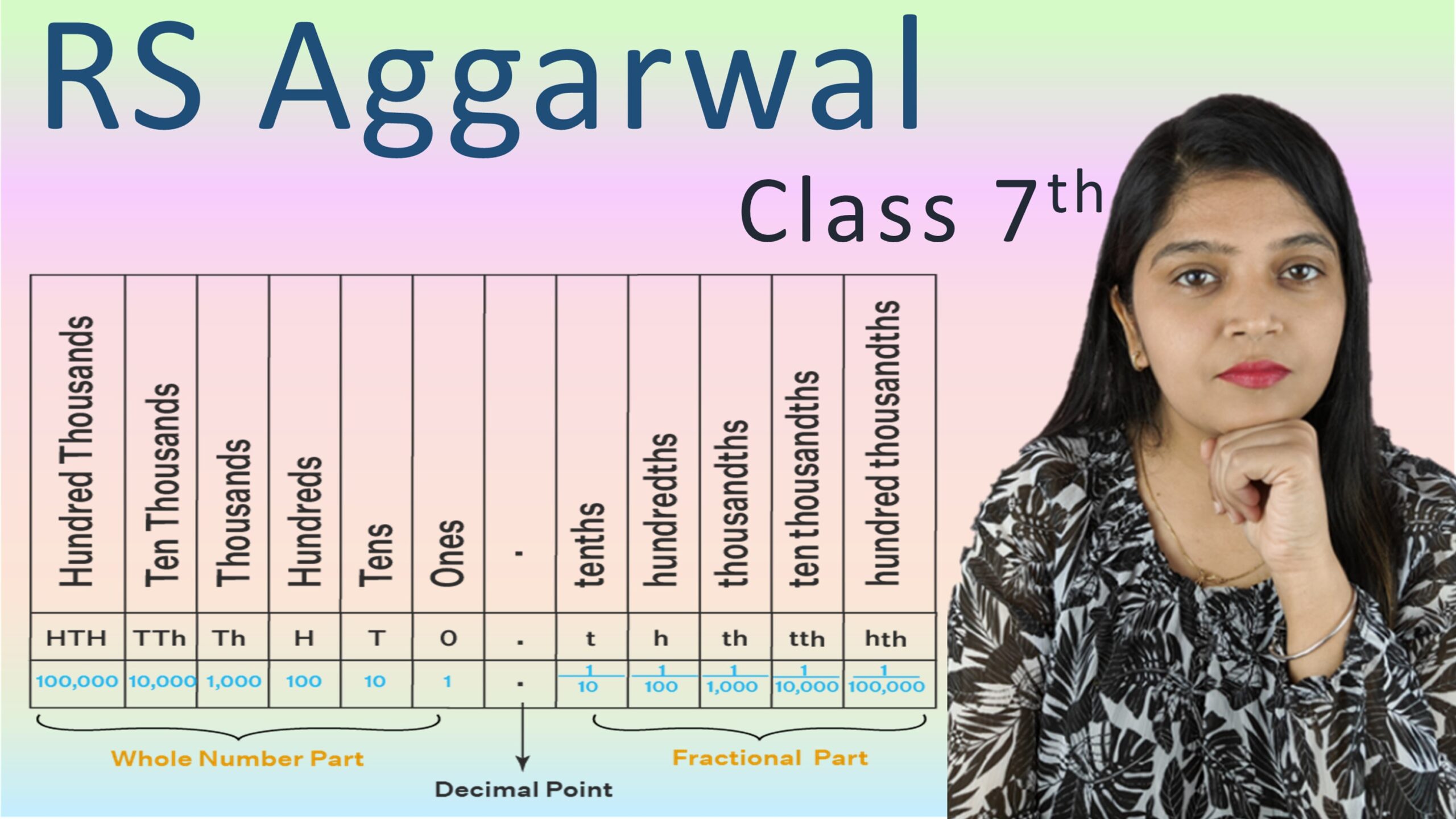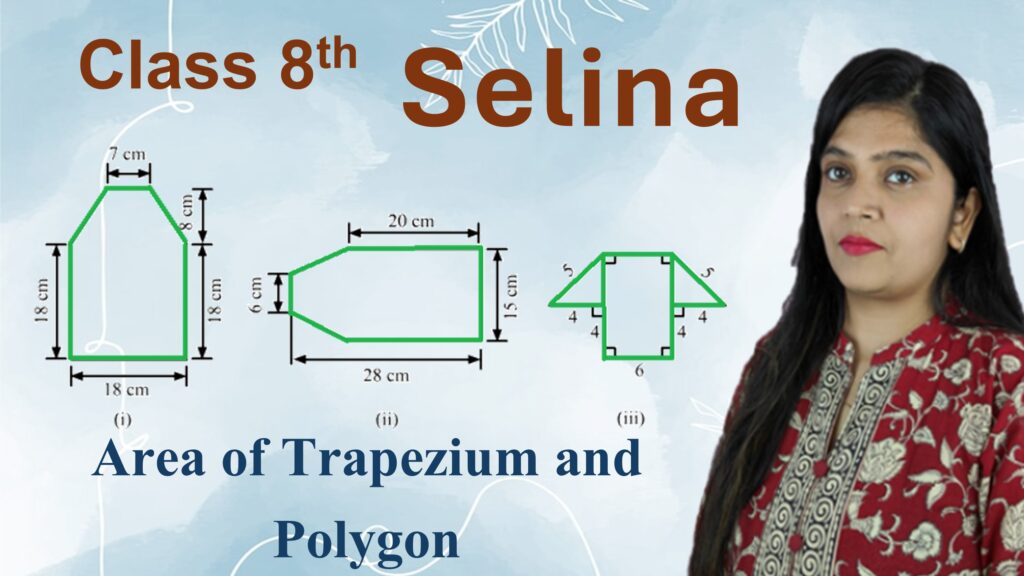Exercise: 3-D
Q1: Divide:
i. \( 2.8 \div 10 \)
We divide 2.8 by 10. Since we are dividing by 10, we move the decimal point one place to the left.
\[
2.8 \div 10 = 0.28
\]
Answer: 0.28
ii. \( 0.63 \div 10 \)
We divide 0.63 by 10. Moving the decimal point one place to the left gives us the result.
\[
0.63 \div 10 = 0.063
\]
Answer: 0.063
iii. \( 3.05 \div 10 \)
We divide 3.05 by 10. Moving the decimal point one place to the left gives us:
\[
3.05 \div 10 = 0.305
\]
Answer: 0.305
iv. \( 245.6 \div 100 \)
We divide 245.6 by 100. Moving the decimal point two places to the left gives us:
\[
245.6 \div 100 = 2.456
\]
Answer: 2.456
v. \( 0.9 \div 100 \)
We divide 0.9 by 100. Moving the decimal point two places to the left gives us:
\[
0.9 \div 100 = 0.009
\]
Answer: 0.009
vi. \( 1.23 \div 100 \)
We divide 1.23 by 100. Moving the decimal point two places to the left gives us:
\[
1.23 \div 100 = 0.0123
\]
Answer: 0.0123
vii. \( 134.2 \div 1000 \)
We divide 134.2 by 1000. Moving the decimal point three places to the left gives us:
\[
134.2 \div 1000 = 0.1342
\]
Answer: 0.1342
viii. \( 23.4 \div 1000 \)
We divide 23.4 by 1000. Moving the decimal point three places to the left gives us:
\[
23.4 \div 1000 = 0.0234
\]
Answer: 0.0234
ix. \( 0.7 \div 1000 \)
We divide 0.7 by 1000. Moving the decimal point three places to the left gives us:
\[
0.7 \div 1000 = 0.0007
\]
Answer: 0.0007
Q2: Divide:
i. \( 20.79 \div 9 \)
We divide 20.79 by 9. Let’s perform long division:
9) 20.79 (2.31
-18
-----
27
-27
-----
9
- 9
-----
0
Answer: 2.31
ii. \( 78.48 \div 12 \)
We divide 78.48 by 12. Let’s perform long division:
12) 78.48 (6.54
-72
-----
68
-60
-----
84
-84
-----
0
Answer: 6.54
iii. \( 142.8 \div 21 \)
We divide 142.8 by 21. Let’s perform long division:
21) 142.8 (6.8
-126
-----
168
-168
-----
0
Answer: 6.8
iv. \( 6.02 \div 7 \)
We divide 6.02 by 7. Let’s perform long division:
7) 6.02 (0.86
-0
-----
60
-56
-----
42
-42
-----
0
Answer: 0.86
v. \( 0.688 \div 8 \)
We divide 0.688 by 8. Let’s perform long division:
8) 0.688 (0.086
-64
-----
48
-48
-----
0
Answer: 0.086
vi. \( 0.125 \div 25 \)
We divide 0.125 by 25. Let’s perform long division:
25) 0.125 (0.005
-0
-----
125
-125
-----
0
Answer: 0.005
vii. \( 0.992 \div 31 \)
We divide 0.992 by 31. Let’s perform long division:
31) 0.992 (0.032
-0
-----
99
-93
-----
62
-62
------
0
Answer: 0.032
viii. \( 0.1728 \div 72 \)
We divide 0.1728 by 72. Let’s perform long division:
72) 0.1728 (0.0024
-0
-----
172
-144
-----
288
- 288
-----
0
Answer: 0.0024
ix. \( 0.12749 \div 61 \)
We divide 0.12749 by 61. Let’s perform long division:
61) 0.12749 (0.00209
0
-----
127
-122
-------
54
-0
-----
549
-549
-----
0
Answer: 0.00209
Q3: Divide:
i. \( 2.24 \div 0.8 \)
We divide 2.24 by 0.8. Let’s perform long division:
0.8) 2.24 (2.8
-16
-----
64
-64
-----
0
Answer: 2.8
ii. \( 1.242 \div 1.8 \)
We divide 1.242 by 1.8. Let’s perform long division:
1.8) 1.242 (0.69
-108
-----
162
-162
-----
0
Answer: 0.69
iii. \( 0.1575 \div 0.21 \)
We divide 0.1575 by 0.21. Let’s perform long division:
0.21) 0.1575 (0.75
-0
-----
157
-147
-----
105
-105
-----
0
Answer: 0.75
iv. \( 0.0144 \div 0.12 \)
We divide 0.0144 by 0.12. Let’s perform long division:
0.12) 0.0144 (0.12
-0
----------
14
-12
-----
24
-24
-----
0
Answer: 0.12
v. \( 0.0783 \div 0.9 \)
We divide 0.0783 by 0.9. Let’s perform long division:
0.9) 0.0783 (0.087
-72
--------
63
-63
-----
0
Answer: 0.087
vi. \( 0.1164 \div 0.012 \)
We divide 0.1164 by 0.012. Let’s perform long division:
0.012) 0.1164 (9.7
-0.108
-----
86
86
-----
0
Answer: 9.7
vii. \( 0.068 \div 0.17 \)
We divide 0.068 by 0.17. Let’s perform long division:
0.17) 0.068 (0.4
-0
--------
68
68
-----
0
Answer: 0.4
viii. \( 0.02324 \div 0.28 \)
We divide 0.02324 by 0.28. Let’s perform long division:
0.28) 0.02324 (0.083
-0
--------
232
224
------
84
-84
-----
0
Answer: 0.083
ix. \( 0.03822 \div 0.049 \)
We divide 0.03822 by 0.049. Let’s perform long division:
0.049) 0.03822 (0.78
-0
---------
382
-343
------
392
-392
------
0
Answer: 0.78
Q4: Simplify:
i. \( \frac{1.3 \times 2.4}{0.39} \)
First, multiply \(1.3 \times 2.4\), then divide the result by \(0.39\).
Step 1: Multiply \( 1.3 \times 2.4 \):
1.3
× 2.4
------
52 ← (1.3 × 4)
260 ← (1.3 × 2, shifted one position left)
------
312
Step 2: Now divide the result \(3.12\) by \(0.39\):
0.39) 3.12 (8
-3.12
-------
0
Answer: 8
ii. \( \frac{2.5 \times 40.4}{50} \)
First, multiply \( 2.5 \times 40.4 \), then divide the result by 50.
Step 1: Multiply \( 2.5 \times 40.4 \):
40.4
× 2.5
-------
100 ← (2.5 × 4)
1000 ← (2.5 × 40, shifted one position left)
--------
1010
Step 2: Now divide the result \(101.0\) by 50:
50) 101.0 (2.02
-100
-----
100
-100
------
0
Answer: 2.02
iii. \( \frac{6.3}{0.3 \times 0.1} \)
First, multiply \(0.3 \times 0.1\), then divide \(6.3\) by the result.
Step 1: Multiply \( 0.3 \times 0.1 \):
0.3 × 0.1 ------ 0.03
Step 2: Now divide \( 6.3 \) by \( 0.03 \):
0.03) 6.30 (210
-6
-----
3
-3
------
0
Answer: 210
Q5: A boy bought 8 pencils for ₹46.80. What is the cost of each pencil?
First, we need to divide the total cost by the number of pencils to find the cost of each pencil.\[ \text{Cost of each pencil} = \frac{46.80}{8} \]Now, divide 46.80 by 8:
8) 46.80 (5.85
-40
-----
68
-64
-----
40
-40
-----
0
The cost of each pencil is ₹ 5.85.Answer: ₹ 5.85
Q6: A car covers a distance of 276.75 km in 4.5 hours. What is the average speed of the car?
The formula for average speed is:\[
\text{Average Speed} = \frac{\text{Total Distance}}{\text{Time Taken}}
\]We are given:
– Total Distance = 276.75 km
– Time Taken = 4.5 hours
Now, substitute the values into the formula:\[
\text{Average Speed} = \frac{276.75}{4.5}
\]Now, divide 276.75 by 4.5:
4.5) 276.75 (61.5
-270
-----
67
-45
------
225
-225
-----
0
The average speed of the car is 61.5 km/h.Answer: 61.5 km/h
Q7: 2.25 m of a cloth costs ₹326.25. What is the cost of 1 m of cloth?
We are given:
– Cost of 2.25 meters of cloth = ₹326.25
To find the cost of 1 meter, we divide ₹326.25 by 2.25:\[
\text{Cost of 1 meter} = \frac{326.25}{2.25}
\]Let’s convert both numbers to remove decimals:
\[
\frac{32625 \div 100}{225 \div 100} = \frac{32625}{225}
\]Now, perform long division:
225) 32625 (145
-225
------
1012 (Bring down 6)
- 900
-------
1125
-1125
-------
0
So, the cost of 1 metre of cloth is ₹145.
Answer: ₹145
Q8: The product of two numbers is 52.8. If one of them is 8.25, find the other.
We are given:
– Product = 52.8
– One number = 8.25
We need to find the other number:
\[
\text{Other number} = \frac{52.8}{8.25}
\]To eliminate decimals, multiply both numerator and denominator by 100:
\[
\frac{5280}{825}
\]Now, perform long division:
825 ) 5280.00 (6.4
-4950
--------
3300
-3300
--------
0
Answer: 6.4
Q9: How many equal pieces, each of length 3.6 cm can be cut from a rope of length 61.2 cm?
We are given:
– Total length of rope = 61.2 cm
– Length of each piece = 3.6 cm
We need to find how many such pieces can be cut:
\[
\text{Number of pieces} = \frac{61.2}{3.6}
\]To remove decimals, multiply both numerator and denominator by 10:
\[
\frac{612}{36}
\]Now perform long division:
36) 612 (17
-36
------
252
-252
------
0
Answer: 17 pieces






Leave a Comment